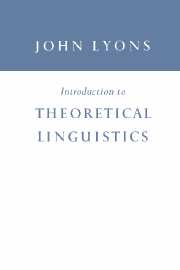Book contents
- Frontmatter
- Contents
- PREFACE TO THE 1995 EDITION
- 1 Linguistics: The Scientific Study of Language
- 2 The Structure of Language
- 3 The Sounds of Language
- 4 Grammar: General Principles
- 5 Grammatical Units
- 6 Grammatical Structure
- 7 Grammatical Categories
- 8 Grammatical Functions
- 9 Semantics: General Principles
- 10 Semantic Structure
- Notes and references
- Addenda
- Bibliography
- Table of symbols and notational conventions
- Index of proper names
- Index of subjects
- Frontmatter
- Contents
- PREFACE TO THE 1995 EDITION
- 1 Linguistics: The Scientific Study of Language
- 2 The Structure of Language
- 3 The Sounds of Language
- 4 Grammar: General Principles
- 5 Grammatical Units
- 6 Grammatical Structure
- 7 Grammatical Categories
- 8 Grammatical Functions
- 9 Semantics: General Principles
- 10 Semantic Structure
- Notes and references
- Addenda
- Bibliography
- Table of symbols and notational conventions
- Index of proper names
- Index of subjects
Summary
Introductory
The priority of sense-relations
In this chapter we shall be concerned with the notion of sense (as distinct from both reference and application: cf. 9.4.1–9.4.8). We have already seen that the vocabulary of a language will contain a number of lexical systems the semantic structure of which can be described in terms of paradigmatic and syntagmatic sense-relations; and we have stressed that these relations are to be defined as holding between lexical items and not between independently-determined senses (cf. 9.4.2).
This last point is of considerable theoretical and methodological importance. It is one of the cardinal principles of ‘structuralism’, as developed by de Saussure and his followers, that every linguistic item has its ‘place’ in a system and its function, or value, derives from the relations which it contracts with other units in the system (cf. 2.2.2–2.2.9). Acceptance of the structural approach in semantics has the advantage that it enables the linguist to avoid commitment on the controversial question of the philosophical and psychological status of ‘concepts’ or ‘ideas’ (cf. 9.2.6). As far as the empirical investigation of the structure of language is concerned, the sense of a lexical item may be defined to be, not only dependent upon, but identical with, the set of relations which hold between the item in question and other items in the same lexical system. The nature of these sense-relations will be discussed in this chapter.
- Type
- Chapter
- Information
- Introduction to Theoretical Linguistics , pp. 443 - 481Publisher: Cambridge University PressPrint publication year: 1968

